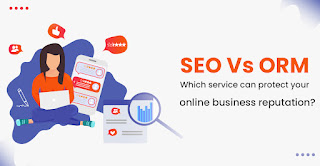SEO Vs ORM: Which service can protect your online business reputation?
Two distinct services are frequently combined but serve quite different functions. In general, Search Engine Optimization (SEO) is utilized to raise your content's position in search results. The phrase "online reputation management" (ORM), which is a little bit more general, is used to precisely manage the online reputation of a person, location, item, size, brand, etc. It is a terrific approach to get a better idea since they both sound very similar by name. Understanding this is essential for making good choices, especially when analyzing your business's reputation.
SEO (Search Engine Optimisation) for online business reputation
Maintaining the first page of search engine results that is full of favorable information about your website and business is the main objective of SEO reputation management. That covers everything, including news articles, online reviews, and social media posts, as well as Google My Business listings.
These SEO tactics will assist you in maintaining your online reputation:
Increase the prominence of positive search rankings
You want customers to pay attention to the positives rather than the negatives. You can enhance positive results to hide unfavorable results, even if you can't directly phone Google and demand that they remove negative news about your site. To ensure that any negative evaluations of your website are drowned out by positive content, you can utilize SEO methods.
For a constant flow of positive feedback on your products and services, you may also request reviews from satisfied clients. These reviews not only appear in search results but also inspire potential customers to buy and have trust in your products and services.
Optimize content across all platforms
You must address content across all platforms to shift attention away from unfavorable outcomes and toward good reviews. That covers everything, from online review platforms like Google and Amazon to social media sites like LinkedIn, Instagram, and Twitter. In rare circumstances, you might need to check news websites and respond to any litigation that might be covered in the media with reference to your company.
If you simply address content on one media, you cannot repair the reputation of your brand. Make a detailed plan to sift through any unfavorable info about your brand.
Respond to negative search results
For every search term, Google's search page displays the top 10 results. You must rank nine other pieces of content higher than the unfavorable results if you want to get them off the front page. Although this can be time- and energy-consuming, the result is worthwhile.
When trying to move undesirable results further down the page rankings, SEO tools are crucial. First, use a tool like Ahrefs or comparable to determine which keywords are impacted. You can focus your SEO efforts on those terms once you know which search terms are returning unfavorable results.
ORM (Online Reputation Management) for online business reputation
Customers are independent, well-informed, and at ease making quick judgments based on web information. User-generated content, or what people have to say about you in reviews and on social networking sites and how they assess you online, is one of the most regarded sources of information. Prospects will look somewhere else if they don't like what they see.
Businesses can use consumer-brand interaction data to improve customer experience and reputation by using ORM.
These ORM strategies will assist you in maintaining your online reputation:
Unharmed market credibility
A brand takes years to develop, yet it can be destroyed totally in a matter of minutes. Online Reputation Management's task is to prevent market events from having an impact on a brand. The public's perception of your brand is what determines your marketing credibility.
Negative factors may affect this perception, but an active ORM makes sure that this doesn't happen. It aids in combating negative feelings and criticism to preserve your credibility.
Due to the release of defective products, unfavorable content, or poor service, huge businesses almost lose market credibility. In those conditions, online reputation management saved brands from the depths of hell while maintaining their credibility.
Defend against rumors.
Spreading rumors about a brand is an example of a black marketing strategy frequently used by rivals. Additionally, rumors can also be created by isolated incidents or personal viewpoints.
The market swiftly picks up rumors and spreads them in all directions without regard for borders. Rumors have the power to destroy a reputable brand. One fundamental aspect of ORM and one of its advantages is its ability to suppress rumors.
It increases sales.
Consumers are likely to search the internet for a particular good or service before deciding whether or not to buy it. They check online reviews to see what other customers have to say about a brand and the goods or services it provides before purchasing a certain business.
Positive online reviews are more likely to attract customers to a company. Businesses that are perceived badly or receive a lot of negative feedback do not benefit greatly from opportunities. This is the rationale behind why businesses need to work to develop positive online reviews with the support of online reputation management.
It increased audience involvement.
Last but not least, once you start managing your online reaction, audience engagement is also positively impacted. People prefer companies with connections, and ORM makes sure yours do! Both the compliments and complimentary remarks, as well as the complaints and complaints, are the responsibility of ORM.
Online reputation management gives the brand a face while giving the impression that it is not a real person they are talking to. This gives your brand more individuality and increases your chances of future market penetration.
Conclusion
The necessity for brands to use both ORM and SEO to optimize their online potential is growing as digital marketing is becoming more crucial for almost every organization.
SEO and ORM services each have their advantages. You can pick from them based on your requirements and goals for the appearance and functioning of your business.



Comments
Post a Comment